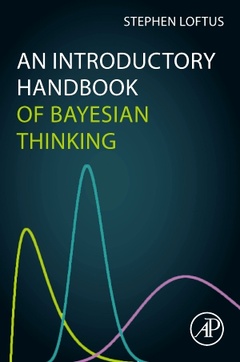Description
An Introductory Handbook of Bayesian Thinking
Language: English
Publication date: 08-2024
350 p. · 15x22.8 cm · Paperback
350 p. · 15x22.8 cm · Paperback
Description
/li>Contents
/li>Biography
/li>Comment
/li>
As Bayesian techniques become more common across a variety of fields, it becomes important for experts in those fields to understand those methods. An Introductory Handbook of Bayesian Thinking brings Bayesian thinking and methods to a wide audience beyond the mathematical sciences. Appropriate for students with some background in calculus and introductory statistics, particularly for nonstatisticians with a sufficient mathematical background, the text provides a gentle introduction to Bayesian ideas with a wide array of supporting examples from a variety of fields.
1. Probability and Random Variables
2. Probability Distributions, Expected Value, and Variance
3. Common Probability Distributions
4. Conditional Probability and Bayes' Rule
5. Finding and Using Distributions of Data
6. Marginal and Conditional Distributions
7. The Bayesian Switch
8. A Brief Review of R
9. Single Parameter Bayesian Inference
10. Multi-Parameter Inference
11. Gibbs Sampling in R
12. Bayesian Linear Regression
13. Bayesian Binary Regression
14. Probabilistic Clustering
15. Dealing with Non-conjugate Priors
16. Models for Count Data
17. Testing Hypotheses with Bayes
18. Bayesian Inference Beyond This Book
Appendix A: Matrix Form of Bayesian Linear Regression
Appendix B: Multivariate Clustering
Appendix C: List of Probability Distributions
Appendix D: Solutions to Practice Problems
2. Probability Distributions, Expected Value, and Variance
3. Common Probability Distributions
4. Conditional Probability and Bayes' Rule
5. Finding and Using Distributions of Data
6. Marginal and Conditional Distributions
7. The Bayesian Switch
8. A Brief Review of R
9. Single Parameter Bayesian Inference
10. Multi-Parameter Inference
11. Gibbs Sampling in R
12. Bayesian Linear Regression
13. Bayesian Binary Regression
14. Probabilistic Clustering
15. Dealing with Non-conjugate Priors
16. Models for Count Data
17. Testing Hypotheses with Bayes
18. Bayesian Inference Beyond This Book
Appendix A: Matrix Form of Bayesian Linear Regression
Appendix B: Multivariate Clustering
Appendix C: List of Probability Distributions
Appendix D: Solutions to Practice Problems
Dr. Stephen Loftus is an Analyst in Research & Development for the Atlanta Braves. Prior to this, he held academic positions at Randolph-Macon College and Sweet Briar College. In his experience in academia and industry, Dr. Loftus has spent a great deal of time studying and developing Bayesian models for a variety of projects. These highly collaborative projects range from analysis in baseball to studies in numerical ecology. In developing these models, he found himself, on many occasions, needing to explain not only the decisions made in making these models, but also the rationale behind the Bayesian philosophy of statistics to individuals with diverse mathematical backgrounds.
- Utilizes real datasets to illustrate Bayesian models and their results
- Guides readers on coding Bayesian models using the statistical software R, including a helpful introduction and supporting online resource
- Appropriate for an undergraduate statistics course, as well as for non-statisticians with sufficient mathematical background (integral and differential Calculus and an introductory Statistics course)
- Covers any more advanced topics which readers may not be familiar with—such as the basic idea of vectors and matrices—as much as needed in order to foster understanding of core concepts
© 2024 LAVOISIER S.A.S.
These books may interest you

Introduction to Bayesian Statistics 140.84 €

Probability and Bayesian Modeling 103.03 €

Handbook of Probabilistic Models 187.99 €

